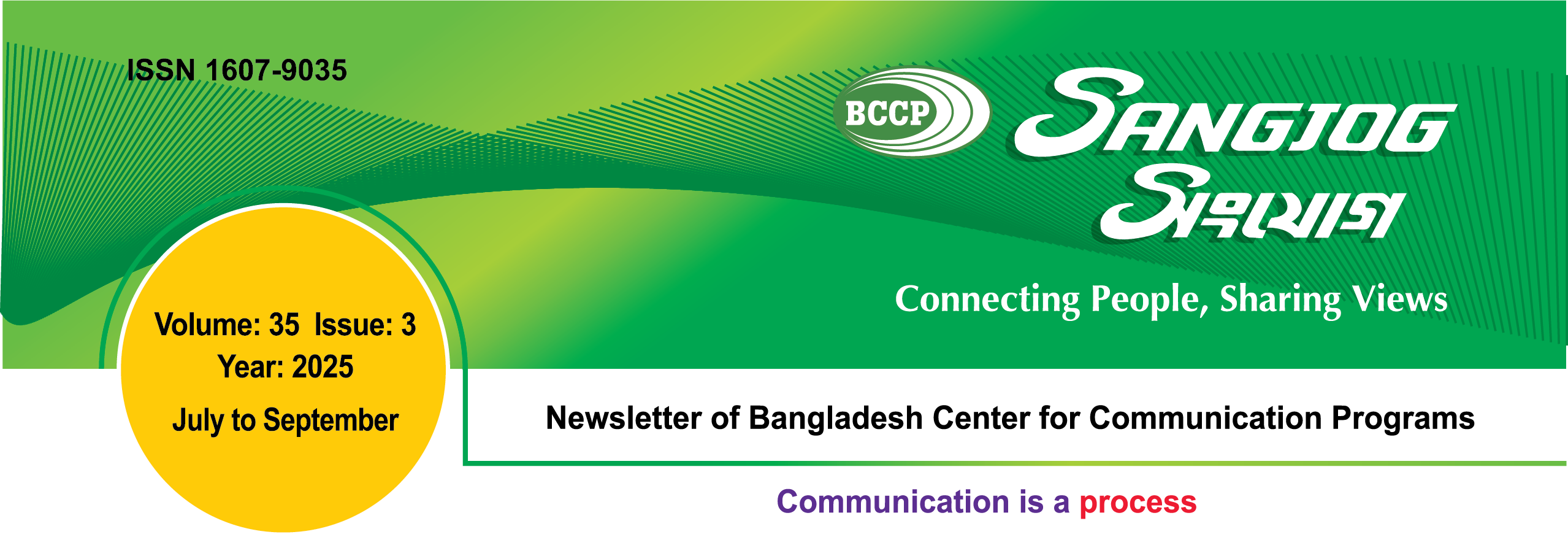
Main Article
When Thought Breeds Trust
BCCP News
Assessing the Need for Tobacco Control Research in Bangladesh
A consultative meeting was held on August 25, 2025, at 10:30 a.m. in the conference room of the Bangladesh Medical Association Bhaban, located on Topkhana Road in Dhaka. The main objective of the meeting was to identify future research needs for tobacco control in Bangladesh.“World Bank Will Continue to Support Bangladesh for Welfare of Vulnerable Communities” – Jean Pesme, Division Director for Bangladesh and Bhutan, The World Bank
A new milestone was achieved under the Emergency Multi-Sector Rohingya Crisis Response Project (EMCRP) with the handover and inauguration of a Multi-Purpose Community Service Center at Rohingya Camp 2W in Ukhiya, Cox’s Bazar. The ceremony highlighted Bangladesh’s commitment, in partnership with the World Bank, to improving the living standards of both Forcibly Displaced Myanmar Nationals (FDMN) and host communities of Bangladesh.
The event was graced by Mr. Jean Pesme, Division Director for Bangladesh and Bhutan at the World Bank, as the Chief Guest. Special Guests included Mr. Javed Karim, Additional Chief Engineer at LGED and Project Director of EMCRP, and Mr. Obaydullah, Additional Refugee Relief and Repatriation Commissioner (RRRC) and Joint Secretary to the Government of Bangladesh. Guests Md. Abdus Salam, Deputy Project Director EMCRP-LGED and Ms. Swarna Kazi, Task Team Leader, The World. The program was presided over by Mr. Md. Fokrul Islam, Camp-in-Charge & Executive Magistrate and Senior Assistant Secretary, Government of Bangladesh. Speaking as Chief Guest, Mr. Pesme emphasized the World Bank’s long-term commitment to supporting Bangladesh’s efforts in managing the humanitarian crisis. “This is my first visit to the Cox's Bazar Rohingya camps as Division Director. I am very happy to see that this project benefits both Rohingya and host of Cox’s Bazar. The disaster shelters are being used not only as safe havens during emergencies but also for education and social services. This is very encouraging. The World Bank will continue to work alongside Bangladesh for the welfare of these vulnerable communities,” he said.
BPPA consults public procurement reforms with all stakeholders
As part of the ongoing efforts to consult stakeholders on the proposed revisions to the Public Procurement Rules (PPR), 2008, the Bangladesh Public Procurement Authority (BPPA) organized a workshop with tenderers and members of the business community at its conference room on 11 August 2025.
Hearing Voices from the Community for Policy Integration and Sustainability under the TRANSFORM Project
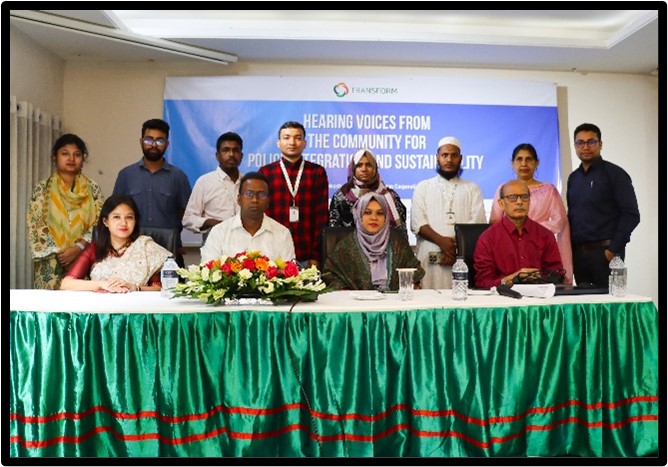 As part of the Community Engagement Activity of the TRANSFORM project, Bangladesh Center for Communication Programs organized a community meeting on July 5, 2025, at Hotel Abakash, Mohakhali, Dhaka, to discuss how the experiences and learnings gained from the TRANSFORM research initiative could be integrated into policy and how the established referral and early identification process for individuals with Serious Mental Disorders through the project could be sustained.
As part of the Community Engagement Activity of the TRANSFORM project, Bangladesh Center for Communication Programs organized a community meeting on July 5, 2025, at Hotel Abakash, Mohakhali, Dhaka, to discuss how the experiences and learnings gained from the TRANSFORM research initiative could be integrated into policy and how the established referral and early identification process for individuals with Serious Mental Disorders through the project could be sustained.
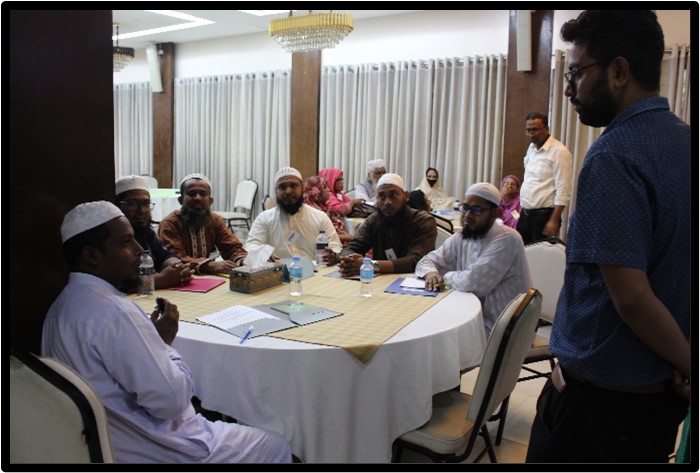 The participants, divided into eight groups from various community groups- including community health workers, traditional and faith-based healers, kobiraj, medicine sellers, teachers, students, patients, and caregivers- actively participated in focus group discussions.
In the day-long discussion, participants opined various ways and means regarding how the TRANSFORM project could be aligned with existing policies. Participants also shared valuable insights on how the activities of the project could be sustained within the Korail community. By the end of the day, a collective consensus emerged: only sustainable policy-level planning can ensure proper treatment and support for individuals suffering from Serious Mental Disorders.
The participants, divided into eight groups from various community groups- including community health workers, traditional and faith-based healers, kobiraj, medicine sellers, teachers, students, patients, and caregivers- actively participated in focus group discussions.
In the day-long discussion, participants opined various ways and means regarding how the TRANSFORM project could be aligned with existing policies. Participants also shared valuable insights on how the activities of the project could be sustained within the Korail community. By the end of the day, a collective consensus emerged: only sustainable policy-level planning can ensure proper treatment and support for individuals suffering from Serious Mental Disorders.
BPPA shares proposed Public Procurement Rules, 2025 with journalists
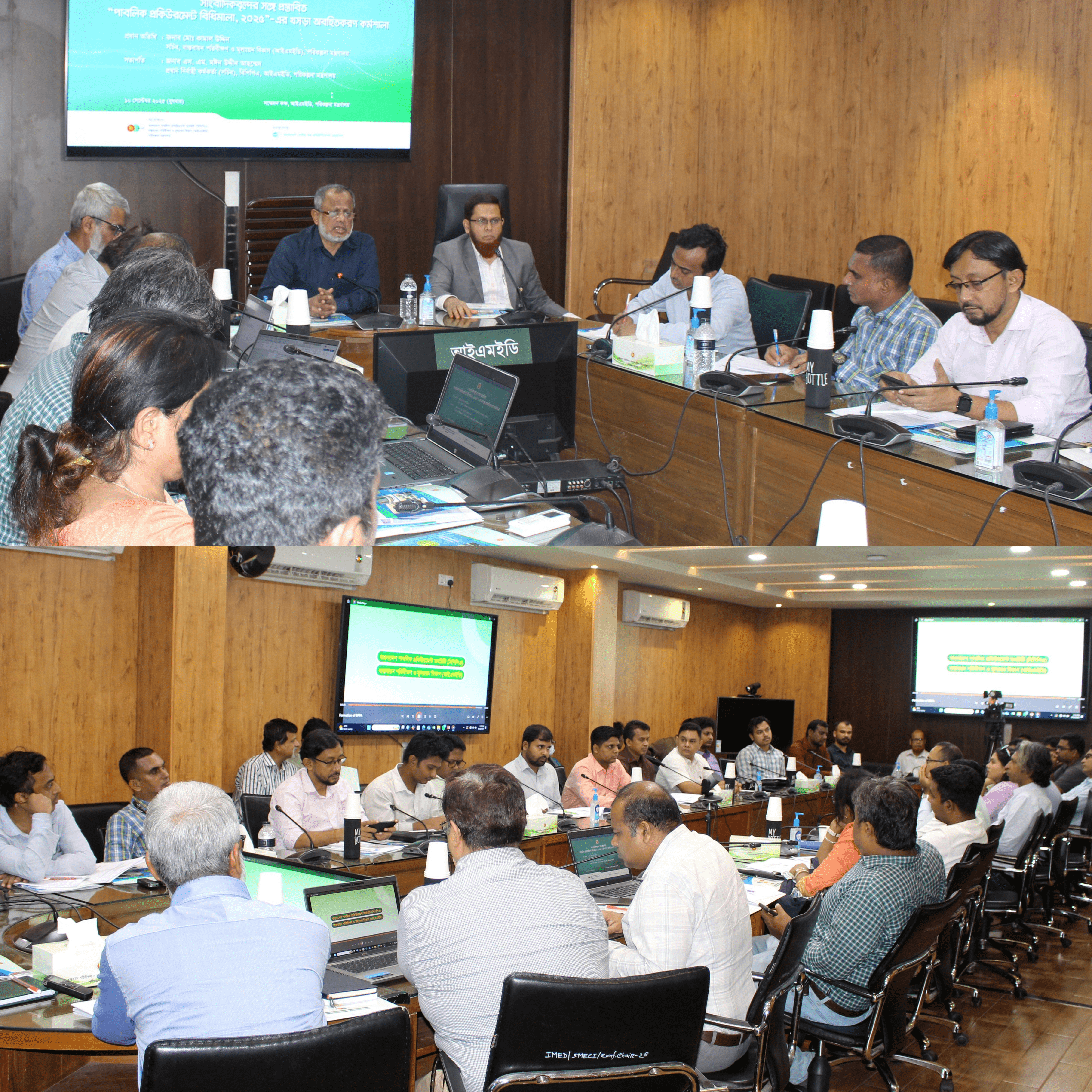 The interim government aims to eliminate political influence and reduce corruption in public procurement through key reforms in the draft Public Procurement Rules (PPR) 2025, said SM Moinuddin Ahmed, chief executive officer of the Bangladesh Public Procurement Authority (BPPA), on Wednesday.
The interim government aims to eliminate political influence and reduce corruption in public procurement through key reforms in the draft Public Procurement Rules (PPR) 2025, said SM Moinuddin Ahmed, chief executive officer of the Bangladesh Public Procurement Authority (BPPA), on Wednesday.
https://www.thedailystar.net/news/bangladesh/news/procurement-reforms-aim-cut-graft-3983146 The Business Standard, September 10, 2025
https://www.tbsnews.net/economy/govt-unveils-draft-ppr-2025-removing-local-procurement-price-cap-1233466 Bangladesh Sangbad Sangstha, September 10, 2025
https://www.bssnews.net/news/310485 Daily Sun, September 11, 2025
https://www.daily-sun.com/epaper/2025-09-11/15 Bangladeshpost, September 11, 2025
https://bangladeshpost.net/posts/bppa-holds-workshop-for-journalists-on-procurement-160432 Samakal, September 11, 2025
https://tinyurl.com/y5382jrs Nayadiganta, September 11, 2025
https://enayadiganta.com/print/313950 Desh TV, September 11, 2025
https://www.desh.tv/national/67164 Kalerkantho, September 11, 2025
https://www.kalerkantho.com/print-edition/last-page/2025/09/11/1575680 Jagonews24, September 10, 2025
https://www.jagonews24.com/m/national/news/1051033 Bangladesh Sangbad Sangstha, September 10, 2025
https://www.bssnews.net/bangla/news-flash/233061 Deshrupantor, September 10, 2025
https://tinyurl.com/4f8pvskd Kalbela, September 10, 2025
https://www.kalbela.com/national/221788 Janakantha, September 11, 2025
https://www.dailyjanakantha.com/national/news/852302 Kholakagojbd, September 11, 2025
https://www.kholakagojbd.com/news/19994 Protidinerbangla, September 10, 2025
https://protidinerbangla.net/national/news/6672 News24bd, September 11, 2025
https://www.news24bd.tv/details/241566 Dhakawave, September 11, 2025
https://tinyurl.com/25re8xf8 Ajkerbazzar, September 10, 2025
https://tinyurl.com/3b6a96kt Jugerchinta24, September 10, 2025
https://www.jugerchinta24.com/national/16216
Editorial: The Power of Trust, An Invisible Foundation of Every Organization
In a world marked by uncertainty, competition, and rapid change, trust remains one of the most powerful yet fragile forces that hold humanity together. Whether in global relations, business networks, social development, or family circles, trust functions as the invisible loop that binds people toward shared goals. When trust weakens, the entire structure of communities and institutions begins to collapse.
Spiritually, trust has been deeply rooted in human consciousness since creation. In Islam, ‘Tawakkul’ the act of placing trust in Almighty Allah while performing one’s responsibilities, symbolizes the highest form of faith. It reflects balance: a reliance not on blind optimism, but on ethical action guided by divine confidence. This spiritual truth mirrors the modern need for trust in all human interactions, trusting one another’s intentions while remaining accountable for our actions. Within families, trust nurtures love, unity, and resilience. It teaches patience and forgiveness, helping relationships survive difficult times. Similarly, in organizations, trust is not a luxury or decoration; it is a lifeline. It builds the moral architecture of teamwork, creativity, and integrity. A workplace without trust becomes a field of insecurity and fear, where employees hesitate to share ideas, leaders grow defensive, and progress freezes. However, trust does not collapse overnight; it erodes slowly, often from within. Bias in leadership is one of its most silent destroyers. When decisions are influenced by favoritism or personal relationships, employees lose faith in fairness. The “I factor,” where ego overshadows collective well-being, further damages the organizational spirit. Overprotective attitudes toward favorite staff divide teams and destroy morale, while others feel undervalued. Rebuilding trust requires participation from everyone, leaders and team members alike. Trust is not built by authority alone but by daily actions, empathy, and respect at every level. Each staff member plays a role through honesty in communication, consistency in behavior, and commitment to shared goals. Empathetic listening, hearing not only words but emotions, becomes a cornerstone of trust. When people feel genuinely heard, they feel valued, understood, and motivated to contribute sincerely. Yet, the role of top leaders or central managers remains the most important. They set the tone for integrity and fairness. When they act with transparency, humility, consistency and communicate with logic/judgement, trust cascades downward, shaping an open and healthy culture. But when they display bias or favoritism, it is organizationally suicidal. A leader’s partiality kills organizational possibilities, discourages initiative, and drives silent disengagement. In contrast, a leader who leads with fairness and empathy can heal mistrust and rebuild unity. A particularly critical test of leadership arises when the leader observes that a potential successor repeatedly demonstrates bias and fails to gain the trust of others. In such moments, the leader faces a moral and strategic decision, whether to protect the organization’s future by seeking an alternative successor or to risk the collapse of teamwork by preserving loyalty to a failing candidate. True leadership demands the courage to prioritize institutional well-being over personal attachment. When a leader allows bias or misplaced loyalty to override sound judgment, it endangers not only team cohesion but the very credibility and sustainability of the organization. Choosing integrity over comfort is, therefore, an act of ultimate trust in the organization’s values. To overcome bias and sustain trust, organizations must replace personal preferences with transparent systems, clear standards for evaluation, open dialogue, and equal opportunity. Accountability must be collective, not punishing. Leaders who acknowledge mistakes, invite feedback, and treat all voices with respect become the true hosts of trust. Ultimately, rebuilding trust is not a one-time initiative, it is a continuous practice. Every interaction, every decision, and every act of listening either strengthens or weakens it. An organization that cultivates trust creates not just productive employees but inspired human beings who believe in their shared mission. Trust is both moral and strategic, a sacred bridge between heart and mind, spirit and system. When we think with fairness, listen with empathy, and lead with authenticity, trust naturally blossoms, and where trust blossoms, excellence follows.ICT and innovation

Microsoft’s AI just got eyes on everything you are doing
Microsoft is expanding the capabilities of its AI assistant, Copilot, with a feature called Copilot Vision, allowing the tool to see and interpret everything on a user's screen. read more...

2.5 billion Gmail users at risk after Google hack: report
Hackers have broken into a Google database, potentially exposing the accounts of more than 2.5 billion Gmail users to targeted scams, according to a report by The Daily Mail. read more...

95% organisations get zero return from using AI tools: Study
With companies across the globe rushing to adopt artificial intelligence (AI) systems to cut costs and boost profits, a damning new Massachusetts Institute of Technology (MIT) study has claimed that most of these projects have not made any impact. The report stated that 95 per cent of organisations that implemented AI systems were getting zero return on the investment. read more...

How does 5G work, and why should we care?
Bangladesh has finally joined the 5G conversation. Big network providers have rolled out the service in selected areas, and the possibilities for your tech-savvy and not-so-savvy friends look bright already in the new world of connectivity. But before we get ahead of ourselves, let's take a moment to consider what 5G is, how it operates, and if we should actually care. read more...

Gemini AI can now turn your kid’s drawing into a storybook
Imagine tucking your child into bed and handing them a freshly illustrated book, crafted in minutes from your own idea — or that of your kid's. With Gemini and your imagination, that moment has arrived. read more...

US regulator probes AI chatbots over child safety concerns
The US Federal Trade Commission announced yesterday (11 September) it has launched an inquiry into AI chatbots that act as digital companions, focusing on potential risks to children and teenagers. read more...
Scoop News: International Publications

These ultra-thin bendy solar panels are so light you can wear them
Developed by Toyota Group company Toyoda Gosei, in collaboration with solar cell startup Enecoat Technologies and textile manufacturer Seiren, the utility vests are fitted with ultra-thin, flexible solar panels that weigh less than four grams each — lighter than a single sheet of paper — and power neck fans to keep the wearer cool. read more...

How do air conditioners work, and what is the effect on the environment?
Heatwaves all over the world are becoming longer and more intense and the need for cooling is rising fast, putting strain not just on power bills but on electricity grids and the planet. With 2024 the hottest year on record and 2025 not far behind, air conditioning is no longer a luxury for many – it’s a lifeline. read more...

To close the climate finance gap, let vulnerable nations use carbon markets
Nothing brings home the urgency of climate change more than living 1.5 metres (5ft) above the rising seas as my country, the Maldives, does. But to cope with climate change, developing countries – like the Maldives and others in the 74-nation Climate Vulnerable Forum – need money. read more...

New Covid-19 Boosters Are Coming Soon. Not Everyone Will Be Eligible to Get One.
New Covid-19 vaccine booster shots are coming to a pharmacy near you after U.S. health officials cleared them Wednesday. But who gets access to the shots, at a time when infections are rising in many states, may be more limited than previous years because of the Trump administration’s narrower approval. read more...

‘Our story’: A day in the life of a handwritten newspaper in Bangladesh
West Sonatala, Bangladesh – An ordinary day for Andharmanik, a small community newspaper, begins in a crowded fish market. Walking down the steps from the road to the fish landing point in Mohipur, a town in the district of Patuakhali bordering the Bay of Bengal, the smell of salt and fish hangs heavy in the air. Next to the main landing platform, colourful fishing boats, painted in faded reds, blues and greens, are moored. read more...

AI weather forecasting institute could shutter after funding cuts
The National Science Foundation will sunset funding for a $20 million artificial intelligence institute designed to improve weather forecasting, a move that could sever a pipeline of scientists from receiving training while also hampering the country’s ability to assess the impacts of hurricanes and other weather disasters. read more...
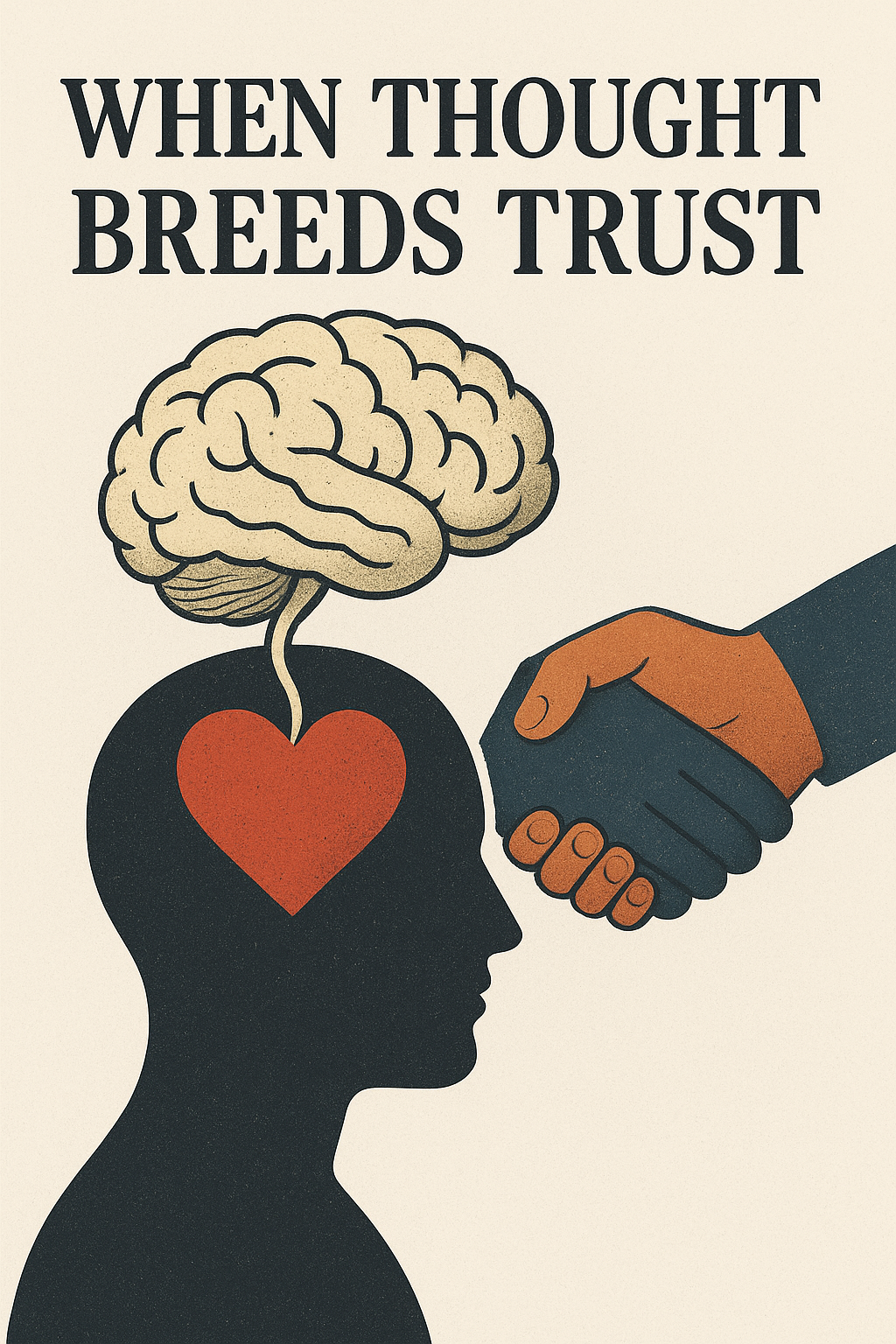 Trust is often viewed as a mental concept, distinct from other emotions, which we apply to people, groups, or even objects. A person's confidence or disbelief is shaped by how they perceive the people, actions, and behaviors around them. The relationship between trust and thought offers important clues as to why relationships, communities, and even institutions may flourish or fail.
Thought and Trust in Organizational Concept
Trust is often viewed as a mental concept, distinct from other emotions, which we apply to people, groups, or even objects. A person's confidence or disbelief is shaped by how they perceive the people, actions, and behaviors around them. The relationship between trust and thought offers important clues as to why relationships, communities, and even institutions may flourish or fail.
Thought and Trust in Organizational Concept 

